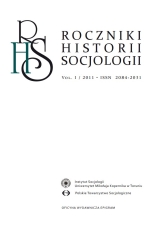Zaangażowanie a neutralność — o trudnościach stosowania pojęcia obiektywności w naukach społecznych. Onto-epistemologiczna logiczna recepcja socjologii Norberta Eliasa
Abstract
In the social sciences area, we can single out two diametrically diff erent projects of social investigation. The one is conducted under the auspices of objectivity (in the manner of Comtean and Weberian value-free sociology), the other under the auspices of the Husserlian tradition of constructivism. Instead of these two traditions, the Norbert Elias’ sociology is to show the very social and historical process of objectivization, i.e., the process in which the social conditions of the need of objectivity—in the social and cognitional meanings – were formed. Objectivity and subjectivity are the social product of historical processes of distribution of two forms of relation to the world: involvement and detachment. The main lessons learned from sociology of Norbert Elias are as follows: Primarily and in the first place, in social sciences there is no equivalence between neutrality and objectivity. What is to count as objective knowledge is not a simple result of neutrality as an attitude. Secondly, in the area of social investigations one cannot contrast directly objectivity vs. subjectivity in the manner of substantialism. Instead, involvement and detachment are categories which grasp with subtlety the correlations between agency and social environment in the historical milieu of the process of subject-formation. Thirdly, we must accept the claim that cognitive agency is in part an effect of self-objectivization processes. Cognition in not only the representation of the external states of affairs but also an instrument of self-creation. As a result, sociology is an element of self-discovery and self-creation, which has socially determined sources and consequences.
 Roczniki Historii Socjologii
Roczniki Historii Socjologii